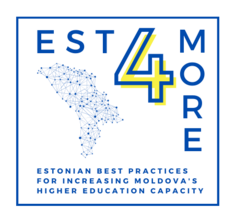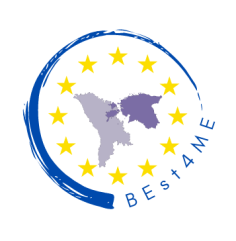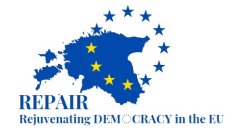Development Projects
International collaboration and development are the key dimensions of the Johan Skytte Institute of Political Studies activities.
We participate in various educational consortia and international projects aimed at research, teaching, international partnerships, mobility of the students and lecturers, and cooperation between universities and society. The Institute has a variety of international partners among universities and research institutions. The cooperation is based on agreements to foster student and staff mobility, research, and higher education cooperation.
The staff of the Institute is involved in several professional networks, both in the form of institutional and individual membership. Co-operation networks aim to represent the shared interests of their members and to serve as forums for exchanging ideas on matters related to higher education and research.

- Timeframe: 2024-2026
- Funding: Cooperation partnerships in higher education (Erasmus+)
- Coordinator: Anna Beitane
- Partners: University of Warsaw, University of Groningen, Alexander von Humboldt Institute for Internet and Society, Manchester Metropolitan University
ActIPLEx aims to combat social polarisation among young people by educating them about the dangers of polarisation and increasing their understanding of the mechanisms responsible for the process. With the help of educational games and social simulations, we will create educational experiences for students and a wider audience, as well as open educational resources about polarisation and dialogue to help motivate young people towards positive dialogue in the situations they face in life.
Within ActIPLEx,we will:
Develop a set of interactive learning experiences in the form of a Massive Open Online Course on Futurelearn, online courses on the University of Tartu and University of Warsaw’s educational platforms
Design, test, refine, and conduct an interactive game-based workshop on polarisation and dialogue, including educational social simulations
Implement and promote the workshop format and online courses within the partnership and for a wider audience (4EU+ Alliance, schools)
Within the project, we plan to reach out to various audiences, including over 1,000 participants in the MOOC on Futurelearn, over 250 participants in open online courses on partner universities’ platforms, and over 200 student participants in the game-based workshop. We will produce a set of Open Educational Resources for teachers: videos, quizzes, texts, social simulation experiments and an educational game and promote those materials during three dissemination workshops for teachers. The game-based workshop format will also be tested in 2-4 secondary schools. All courses and workshop participants will be better equipped to recognize, understand, and prevent social polarisation.

- Timeframe: 2024-2025
- Funding: Põhja- ja Baltimaade haridusprogramm Nordplus
- Coordinator: Anna Beitane
- Partners: Kaunas University of Technology, Tampere University, University of Turku
The EmpowerAI network aims to enhance the digital competencies of teachers in the fields of social sciences and arts, focusing on the responsible and ethical use of AI tools in study processes. The project will achieve this objective through conducting co-design workshops, piloting training materials at partner universities, assessing results and producing assessment report with recommendations for higher education institutions (HEIs) in the region.
The EmpowerAI network builds on pre-existing successful cooperation among partners as part of previous Nordplus cooperation and Erasmus+ projects and exchange programs. The project innovates by developing a hands-on program for social sciences and arts educators, using co-design and design thinking methods to produce training materials and engage various stakeholders in the HEI ecosystem in its activities. The teaching staff participating in the training will be able to apply developed materials in their own classrooms.

- Timeframe: 2024
- Funding: Estonian Centre for International Development (ESTDEV)
- Coordinator: Stefano Braghiroli
- Partner: University of Tartu (coordinator), Moldova State University
The aim of the EST4MORE project:
The project addresses challenges faced by Moldovan HEIs through engaging three target audiences: 1) equipping educators with digital skills and strengthening e-learning quality assurance practices; 2) enhancing MA students’ knowledge of European integration and improving “future skills” to make them competitive in the labor market as the next generation of European leaders; 3) uplifting the professional skills of doctoral students by creating networking opportunities with the Estonian researchers to facilitate the transfer of know-how and best practices.

- Timeframe: 2024
- Funding: NATO Public Diplomacy Programs
- Coordinator: Stefano Braghiroli
- Partner: University of Tartu (coordinator), Normandy for Peace, University of Caen Normandy, University of Bordeaux and Catholic University of Lille.
The project aims to favour discussion, exchange of ideas, deep bilateral understanding, and contextualization of France and Estonia’s efforts to counter hybrid foreign threats aimed at undermining trust in democracy and transatlantic unity. The goal of the proposed project is to explore, contextualize, and understand the challenges posed by disinformation and hybrid foreign interference both domestically and in foreign policy terms.
Timeframe: 2023-2024
Image
- Funding: Estonian Centre for International Development (ESTDEV)
- Coordinator: Stefano Braghiroli
- Partner: University of Tartu (coordinator), Moldova State University
The aim of the Best4ME project is to:
- Build teaching competencies and expand the portfolio of innovative learning experiences at Moldovan HEIs to strengthen educational capacity and apply innovative teaching methods in European Studies by university teaching staff;
- Enhance students’ knowledge and interest in European Studies to motivate them to specialise and gain knowledge and skills to prepare them for future EU-related careers or public sector jobs, furthering Moldova’s Europeanisation process.
As a result of the project, teaching staff from MSU will benefit from trainings designed to expand the portfolio of modern pedagogical approaches for teaching European Studies and innovative techniques for digital education offered in Moldovan universities. Students of international relations, political science, and public administration in Moldova will have the opportunity to participate in online and in-person specialist courses on topics related to European Studies at UT, attend a study trip to Tallinn to experience EU institutions in action, and apply for a scholarship to conduct an independent MA thesis research project on an EU-related topic with mentorship by UT staff. At the end of the project, the project findings will be disseminated in a strategy report drafted by UT and MSU to relevant stakeholders in Moldova.

- Timeframe: 2020-2023
- Funding: Jean Monnet Module (Erasmus+)
- Coordinators: Stefano Braghiroli, Anna Beitane
- Partners: the University of Tartu and partnering experts from Albania, Armenia, Finland, Montenegro and Poland
The proposed module aims to create new knowledge, tools, and resources related to Europeanization towards the European Union’s Eastern neighbourhood, candidate countries, and - more in general - wider Europe. The context that requires such effort is one in which the ‘expansive’ potential of European integration is increasingly unsettled and challenged by alternative models of regionalism.
This Jean Monnet action is functional to creating and supporting a new “European Union –Russia Studies” module within the framework of the master’s programme in “International relations and regional studies” at the J. Skytte Institute of Political Studies, University of Tartu. Within the module's framework, emphasis will be given to coherently and synergically integrated innovative teaching methods, bi-directional interactivity, blended learning, and open educational resource (OER) material. The module offers a multi-disciplinary and diverse methodological perspective on the process of European integration, the EU’s relations with its Eastern neighbourhood and Russia and with different alternative models of regionalism in Europe and Eurasia. The offer of in-class and online courses as well as the other activities developed with the framework of the module has been attentively crafted to ensure the best balance of multi-disciplinary and methodological diversity.

- Timeframe: 2022-2025
- Funding: Erasmus+ Strategic Partnerships
- Coordinator: Anna Beitane
- Partner: Istanbul University; the University of Tartu, Catholic University of the Sacred Heart (Università Cattolica del Sacro Cuore), University of Ljubljana, Istanbul Commerce University, University of Bucharest
The objective of DD-Tech is to develop a “Digital Diplomacy Module” that enables our students to develop skills to carry out digital diplomacy culture, apply it in innovation processes and improve their technological response/solutions capacities. This project aims to develop a digital-based standard curriculum among European countries within the scope of a Digital Diplomacy course for a future-based education model, the use of digital education and communication tools, training of “future diplomats” who can comprehend the global trends to create joint projects, to increase collective design capabilities, to promote a culture of collaboration.

- Timeframe: 2023-2026
- Funding: 100 000 EUR
- Coordinator: Piret Ehin, Varje Kuut
The Rejuvenating Democracy in the EU (REPAIR) Jean Monnet Centre of Excellence will improve teaching and research in the area of EU Studies by analysing and seeking solutions to a wide range of contemporary challenges to democratic politics and governance in the European Union. This includes citizens’ growing dissatisfaction with the performance of democratic regimes, diminished trust in political institutions, eroding support for democratic principles, low electoral turnout, the rise of populist, extremist and Eurosceptic parties and movements, political polarization and radicalization, party system instability, and growing refusal of various political actors to play by democratic rules and accept the results of democratic elections. Given its geographical location in Tartu, Estonia, the Centre will pay particular attention to developments in the Baltic region and Central and Eastern Europe more broadly; it will also focus on democratic and authoritarian tendencies in the EU’s Eastern Neighbourhood. REPAIR will foster dialogue between the academic world, the public sector, civil society and different levels of education and media by modernizing and expanding EU-focused curricula and courses at the University of Tartu, generating new policy-relevant knowledge about contemporary threats to democracy as well as viable solutions, and launching a comprehensive training program for civics teachers in Estonian schools.

- Timeframe: 2023-2025
- Funding: Cooperation partnerships in higher education (Erasmus+)
- Coordinators: Anna Beitane, Yurii Kondratyk, Fidan Vali
- Partners: Tallinn University; Kaunas Technical University, Web2Learn, University of Latvia, Lviv Polytechnic National University
Since the beginning of the Russian aggression on Ukraine, numerous Ukrainian citizens have been forced to leave their homes in order to seek refuge in safer spaces. According to the United Nations, millions of people have fled their homes since then. Since February 2022, the Baltic states have become a safe haven for Ukrainians. This harsh reality has motivated partners of the Baltics4UA project to engage in social actions for the benefit of Ukrainians in need. There is an urgent need to upskill HE staff and strengthen Baltic HEIs’ capacity building in crisis response. Baltics4UA project stimulates innovative educational practice and staff upskilling at Baltic HEIs through cross-cultural dialogue, citizen engagement, business-academia cooperation.
Baltics4UA project will place emphasis on integrating the values of human dignity, human rights and solidarity in Baltic societies.

- Timeframe: 2023-2024
- Funding: Nordplus higher education (development project)
- Coordinator: Anna Beitane
- Partners: University of Tartu, University of Helsinki, Uppsala University and Vilnius University
The EnVision network brings together four innovation-oriented universities in the Nordic-Baltic region (University of Tartu, Vilnius University, Uppsala University, and University of Helsinki) with a range of experiences in designing and running Virtual Exchanges (VEs) in order to 1) facilitate the sharing of knowledge and best-practices and 2) co-design VEs course scenarios and produce shared guidelines for implementing VEs. The network will strengthen regional cooperation channels, creating a hub of excellence in innovative digital teaching methods and VEs.
The network addresses the need of social sciences departments to 1) expand the scope of international and intercultural opportunities offered to students to create competitive, inclusive, and diverse study environments and 2) integrate digital competencies and transferrable skills (intercultural communication, critical thinking, problem solving, teamwork) into course curricula to enhance graduate employability.
In order to achieve these goals, the members of the network will execute the following work packages: WP1 project management; WP2 Virtual Exchange Seminars and Scenario Design; WP3 Virtual Exchange Toolkit.

- Timeframe: 2022-2023
- Funding: Nordplus (Higher Education)
- Coordinators: Anna Beitane, Andrey Makarychev, Alexandra Yatsyk
- Partners: the University of Helsinki, University of Tartu, University of Latvia, Vilnius University
The Baltic-Nordic Network for the Advancement of Methodology in Area Studies (BAMSE) promotes state-of-the-art research and education in area studies in the Baltic-Nordic area by concentrating on the theoretical and methodological underpinnings of area studies. The network is a meeting point for ideas and people aiming to reevaluate and advance area studies theories and methodologies. BAMSE is a collaboration of teachers, researchers, students, and stakeholders from various partner institutions.
One of the key activities of the BAMSE is organising an intensive course for advanced bachelor’s students and master’s students in Vilnius (2021), Tartu (2022), and Riga (2023).
The joint courses highlight area studies' significance and embedded potential in understanding transnational challenges regarding underlying changes in power structures/relations, identity constructions, communication, symbolic politics, and culture.

- Timeframe: 2020-2023
- Funding: Horizon 2020 (European Commission)
- Coordinators: Hector Pagan, Elis Vollmer, Lenard Milich, Hanna Laius, Mariia Chebotareva
- Partners: University of Tartu and partnering experts from Austria, Croatia, Czech Republic, Estonia, Germany, Hungary, Latvia, Poland, Romania, and Slovenia
Johan Skytte Institute of Political Studies, in collaboration with Tartu Regional Energy Agency, is leading the “Central and Eastern European Sustainable Energy Union” (CEESEU) project, funded by the European Union Horizon 2020 program. CEESEU is a 3-year project, ending in 2023.
In the CEESEU project, we are demonstrating the entire strategic process of the green transition for municipal governments, from preparing a climate strategy to acquiring the necessary funds, to evaluating results, by creating examples of at least 60 successful cities in the region.
The main object of CEESEU is to increase the Central and Eastern European municipal governments’ and policymakers’ capabilities of working out sustainable energy and climate action plans (SECAP) and better resilience to climate change, which are important factors in achieving the EU climate goals. Several reasons explain why Central and Eastern European municipal governments are falling behind in developing SECAPs. Some of these reasons may include little knowledge or interest towards the strategic planning process, low municipal capability or lack of access to resources, or little experience in including interest groups effectively.
Additionally, the project supports the strengthening and development of the Central and Eastern European Sustainable Energy Network (CEESEN) to further advance the goals of EU’s climate politics, increase local communities’ energy security, and resilience to climate change. The Network is becoming a successful figure in protecting the Central and Eastern European interests at the EU level, and is helping topical European associations (e.g., Covenant of Mayors) be more mindful of the unique circumstances of Central and Eastern Europe.
Project’s consortium had set the following goals for the project’s duration:
- 650 GWh of energy savings
- Advancing the skills and capability of at least 530 municipality government workers in Central and Eastern European municipalities
- Better alignment of national and regional development plans with SECAPs in the CEESEU region and improved national and regional sustainable energy and energy efficiency policies
- At least 25 million euros of additional investments to sustainable energy and climate change adaptation
Though there is still time until the project’s deadline, it is already clear that all aforementioned goals are not only met but surpassed, which speaks volumes about the commitment of the included municipalities.
Final project results will be introduced at CEESEN’s fall conference in Budapest, Hungary, on Sept 8-9, 2023.

- Timeframe: 2024-2027
- Funding: Capacity building in higher education (Erasmus+)
- Coordinator: Anna Beitane
- Partners: Union Nikola Tesla University - Faculty of Security and Diplomacy, Western Balkans Institute, University of Bjeljina, University of Tuzla, University of Banja Luka, University of Kosovska Mitrovica, Center for Social Innovation
The project aims to enhance resilience and preparedness in the Western Balkans (WB) by addressing key security challenges such as organized crime, terrorism, misinformation, and socio-political instability. Despite economic progress and EU integration efforts, the region remains vulnerable due to historical tensions and socio-economic difficulties. TRUST seeks to strengthen higher education institutions (HEIs) and empower individuals, particularly underrepresented groups, by fostering regional collaboration and enhancing security governance, human rights protection, and societal stability.
To achieve these goals, TRUST will modernize HEI curricula, integrating topics like health security, food security, and cyber threats while improving data collection and analysis on security trends. The project promotes international cooperation, training programs for university staff, and regional workshops to engage stakeholders. By fostering knowledge exchange and policy recommendations, TRUST aims to create a more secure and cooperative WB region in alignment with EU security and development priorities.

- Timeframe: 2024-2027
- Funding: Cooperation partnerships in higher education (Erasmus+)
- Coordinator: Anna Beitane
- Partners: University of Lodz, European Elearning Institute, Univerzitet u Beogradu, ACEEU GmbH, Technological University of the Shannon: Midlands Midwest
The project aims to advance university community engagement in Europe by the means of creating a peer-to-peer learning Alliance for Community Engagement where university staff are brought together and empowered to fixate their engagement initiatives on the real needs of the community. This goal will be achieved by building the capacity of university community-engaged staff and equipping them with an innovative platform, practical tools and dynamic training to transform their community engagement strategies into more effective and strategic course of actions.



